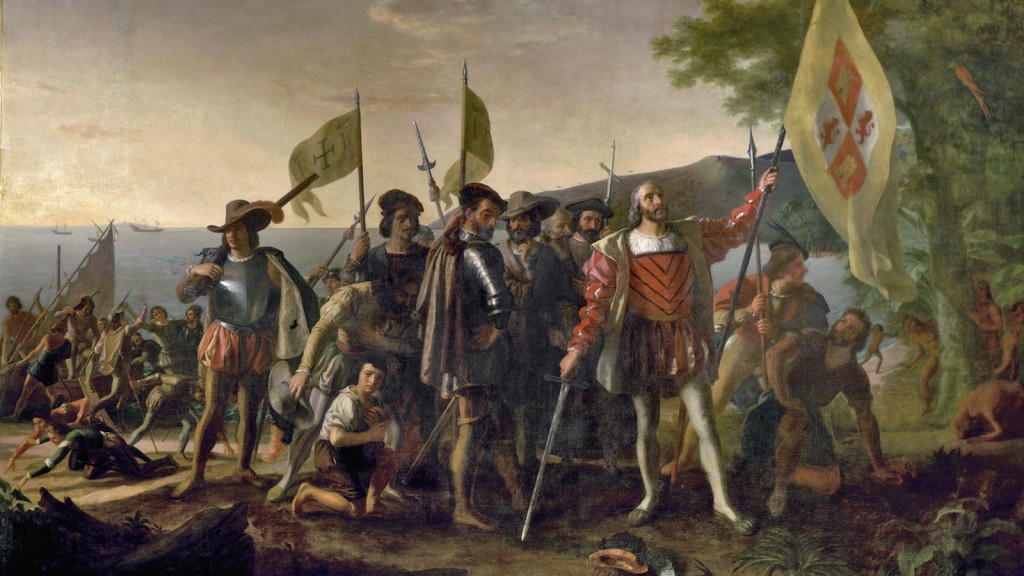Columbus Day, 12 October, Is a Reminder That Nothing Exists Until a White Guy “Discovers” It
HISTORY, 12 Oct 2015
Jake Flanagin, Quartz – TRANSCEND Media Service
At this point, it’s pretty much common knowledge that Christopher Columbus was not, in fact, the first European to come to the New World. Archaeologists have uncovered evidence of Norse settlements in Newfoundland, Canada, dating as far back as the ninth century. Meanwhile recently uncovered DNA evidence suggests Polynesians landed on South American shores almost a century before the Nina, the Pinta, or the Santa Maria.
Yet to suggest that any of these parties—Columbus or the Vikings or the Polynesians—“discovered” the Americas is not simply revisionism; it’s flat-out incorrect.
We know that Native Americans were living in the Americas for thousands of years before the arrival of Europeans. We know their ancestors crossed the Bering Land Bridge from northeastern Asia, and in the ensuing 10,000 to 15,000 years populated the New World with civilizations as diverse and distinct as the Mayans, the Inuit, [the Tupi-Guaranis in the South], and the Mapuche.
And yet, we still honor Christopher Columbus, an Italian in the employ of the Spanish crown, for ostensibly “discovering” the Americas. Why? Because our historiographical language maintains that, unless a white dude knows about a place, it doesn’t exist. Unless it’s documented in the Spanish royal archives, or the record books of the Dutch East India Company, or the Bible, it’s not a thing. It isn’t real.
Cities across the United States and Canada are finally starting to wake up to the damage wrought by Columbus’s expedition, acknowledging why it’s wrong to blindly worship a man for essentially jump-starting the systemic extermination of two continents worth of indigenous societies. Several of these cities have begun to institute Indigenous Peoples’ Day in its place. And that’s a step in the right direction.
But we can’t just change the name of the holiday if we aren’t also addressing Columbus Day’s de facto erasure of Native American history.
Beyond cursory examinations of the Inca, the Maya, and the Aztecs, students in North America are generally taught hemispheric history from 1492 onward. Rarely do we see social studies curricula spend much time on the fascinating exploits of the Olmec, the mound-building practices of Poverty Point culture, or intricate trade routes of the Caribbean Arawak. Students are not taught about the complex, nonverbal “wampum” constitution of the Iroquois Confederacy, or the singular architectural stylings of the Anasazi
Instead, we jump from Columbus’s landing in what is today the Bahamas to the first Thanksgiving shared between Massachusetts pilgrims and the Wampanoag. (Which is a whole other flawed narrative.) And from there, history teachers remain largely silent on Native Americans until the 19th century Battle of Little Bighorn and the Trail of Tears—a brutal forced march of over 100,000 Native Americans orchestrated by the federal government in the 1830s.
Essentially, this educational strategy frames the entire Native American experience as one of tragedy—which, over the last three hundred years or so, it certainly has been—but totally neglects the fact that pre-Columbian America was just as diverse, socially and politically complicated, and frankly exciting as Europe or the Middle East. There was warfare, diplomatic intrigue, rich mythology; innovation in the arts, sciences, and mathematics, and so much more going on than modern history books would have you believe.
The Americas didn’t simply spring out of the ocean just so our Genoese “hero” could plant a Spanish flag in her. In 1492, Columbus sailed the ocean blue… and that’s about it. Native Americans absolutely should have their own holiday. But thousands of years of history and culture deserve so much more recognition than one Monday a year.
___________________________
Jake is a reporter at Quartz. He was previously a digital writer for The New York Times, and prior to that, an editorial fellow with The Atlantic. Obsessions include geopolitics, human rights, and postcolonialism.
DISCLAIMER: The statements, views and opinions expressed in pieces republished here are solely those of the authors and do not necessarily represent those of TMS. In accordance with title 17 U.S.C. section 107, this material is distributed without profit to those who have expressed a prior interest in receiving the included information for research and educational purposes. TMS has no affiliation whatsoever with the originator of this article nor is TMS endorsed or sponsored by the originator. “GO TO ORIGINAL” links are provided as a convenience to our readers and allow for verification of authenticity. However, as originating pages are often updated by their originating host sites, the versions posted may not match the versions our readers view when clicking the “GO TO ORIGINAL” links. This site contains copyrighted material the use of which has not always been specifically authorized by the copyright owner. We are making such material available in our efforts to advance understanding of environmental, political, human rights, economic, democracy, scientific, and social justice issues, etc. We believe this constitutes a ‘fair use’ of any such copyrighted material as provided for in section 107 of the US Copyright Law. In accordance with Title 17 U.S.C. Section 107, the material on this site is distributed without profit to those who have expressed a prior interest in receiving the included information for research and educational purposes. For more information go to: http://www.law.cornell.edu/uscode/17/107.shtml. If you wish to use copyrighted material from this site for purposes of your own that go beyond ‘fair use’, you must obtain permission from the copyright owner.
